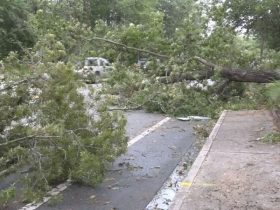A initiative to install 100 license plate reading cameras in the San Fernando Valley was announced by city leaders and law enforcement officials, who hope the cameras will aid in the tracking down of offenders.
Multiple cameras have already been placed in the Porter Ranch neighborhoods north of Rinaldi Street since officials claim that these areas have some of the highest rates of crime in the city.
“Last year, the Devonshire District reported that homes north of this very street experienced a 103% jump in home burglaries,” District 12 Councilman Jon Lee stated at an event.
By the end of the year, dozens more automated license plate readers, or ALPRs, will be placed at significant junctions in Porter Ranch, Chatsworth, Northridge, Granada Hills, West Hills, and North Hills, as well as other parts of the northwest San Fernando Valley.
The project received a $500,000 allocation from Councilman Lee, and law enforcement officials stated that it could not come at a better time given that the Los Angeles Police Department is severely understaffed, with only 9,000 sworn officers—the fewest in over 20 years.
LAPD Interim Chief Dominic Choi stated at the event, “I promise you, this is going to have an impact on crime. ALPRs allow officers to scan and capture license plate data in real time, helping us identify vehicles associated with criminal activities.”
The LAPD computer system, which officials claim protects privacy, receives the vehicle data after it is taken by the cameras.
Lee clarified, saying, “Only a very specific group of LAPD investigators are able to engage the system to conduct searches.”
As of right now, the city has 160 cameras of its own, and 1,500 LAPD cars are outfitted with cameras. Officers equipped with in-car computers have access to warnings and data about stolen vehicles, missing persons, wanted suspects, and more.
Martha Carasco expressed her regret that the ALPRs weren’t put sooner. Her house has been broken into twice, the most recent being in April.
“They dragged the safe through my balcony,” she stated. “The police department estimated that the getaway car was just in front of our house. Had these cameras been in place, they probably would’ve caught all the robbers from my house.”
Opponents of the automated readers exist, despite Chief Choi’s approval for the usage of ALPRs, stating that the cameras in the LAPD’s South Bureau helped solve numerous high-profile crimes.
Read Also: Major DMV Update: California Drivers to Face Key Changes Starting October 2024
According to the Los Angeles Times, a grand jury in Sacramento County earlier this year found that detectives from the police and sheriff’s departments had improperly given out-of-state law enforcement agencies access to license plate data and possibly other private information belonging to county residents.
Concerning the storage and use of data obtained by ALPRs, nonprofit watchdog groups such as the ACLU and the Electronic Frontier Foundation have submitted public record act requests against a number of California law enforcement organizations, including the L.A. police and sheriff’s departments.
Attorney General Rob Bonta of California released two advisories in October of last year outlining “policies regarding the use of data collected or accessed through the Automated License Plate Reader system” and the obligation of state law enforcement agencies to protect the data.
By: ktla.com








Leave a Reply